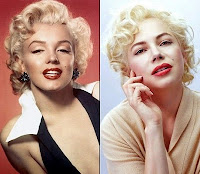I postponed seeing Australia (2008) because most of the
people who recommended it to me don't generally give me good movie
recommendations. I sat down to watch this nearly three hour movie expecting a
overlong, bland movie about a couple who bicker and fight, then fall in love
and live happily ever after. It turns out Australia
was much better, and much more rich than I had assumed.
In northern Australia at the
beginning of World War II, an English aristocrat, Lady Sarah Ashley (Nicole
Kidman), inherits a cattle station the size of Maryland called Faraway Downs.
When English cattle barons plot to take her land, she reluctantly joins forces
with a rough-hewn stock-man Drover (Hugh Jackman) to drive 2,000 head of cattle
across hundreds of miles of the country's most unforgiving land, only to still
face the bombing of Darwin, Australia, by the Japanese forces that had attacked
Pearl Harbor only months earlier.
I'm sure the country Australia was
somewhat romanticized in this movie, but wow! Australia spared no expense to show us some gorgeous shots of the
outback. We get to see some Australian historical tidbits that I was unfamiliar
with such as racism and Japan attacking Australia during World War II. I knew
Japan attacked Australia, but most of my WWII studies revolve around The United
States, Great Britain, Germany, and Japan; most other country's involvement
seems to get swept under the rug. Australia
is full of rugged cowboys reminiscent of Crocodile
Dundee, Aborigine culture, and gorgeous Australian wildlife and wilderness.
This movie shows us the Australia of our dreams.
The characters were good, too. Lady
Ashley was hilarious for the first part of the film, being a pompous, lady-like
British aristocrat who is shocked and appalled by nearly everything the brawny
Australians do. She sees herself as the only civilized woman on the continent
and believes that every graceless man there intends to have his way with her.
The British seem to have a long standing practice of dressing in warm climates
as if they were not, and Lady Ashley keeps up the tradition.
Drover gets his name from his job; a
Drover is an experience stockman who moved livestock. I've seen Hugh Jackman in
a number of movies but I think this is the first time I've seen Jackman
actually use his native Australian accent. If you needed a rugged, manly
Australian character in your movie, Jackman is easily your best bet. Kidman and
Jackman bounce off of each other really well. Early on, Drover is talking to
Lady Ashley about breeding horses which she erroneously interprets as coming on
to her. Drover is offended by this and sparks fly and hilarity ensues. They do
comedy bits well together, but they also have good chemistry. Later on they
develop romantic interest in one another and while their characters clash, I
can still buy their love.
Part of what draws the characters
together is a Nullah (Brandon Walters) who is half-aboriginal, half-white. The
boy is about 11, lives with his mother who works at Faraway Downs. Walters was
a great kid actor and does a fantastic job of playing a tragic character. Since
Australia is basically a western,
there has to be evil cattle tycoons and rattlers. Neil Fletcher (David Wenham)
plays both roles at some point in the movie. He's a great villain and makes
very personal attacks on each character, and of course it's all about money and
revenge for him.
Australia
sounds like a long romantic western, but there are some excellent action
scenes; brawling bar fights, stampedes, bombed harbors, hiding from Japanese
invaders, and more. There were times I was on the edge of my seat, especially
the scene where the stampeding cattle are headed for a cliff. The movie was
longer than I thought it needed to be. At times it appeared that the movie was coming to a nice place to end
and wrap things up. But a small new plot development appeared and moved the
story forward. This happened two or three times before the end credits started
rolling. That isn't to say it was bad, Australia
simply felt a bit longer than it needed to be.
Australia
was a good movie, almost like an Australian Gone
With the Wind. Good acting, great cinematography, romance, action, and
drama; what's not to like? I imagine most men would be put off from Australia at first since it really does
look like a dull "chick flick" at first glance. There is a good blend
of action and drama that I think would give Australia
an appeal to most any type of movie watcher. This is an excellent, worthwhile
renter and I could see some people enjoying it enough to want their own copy.







